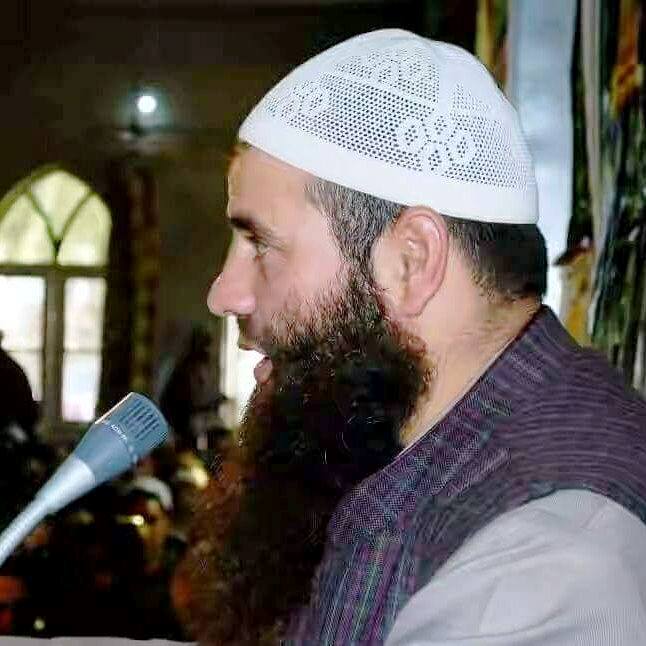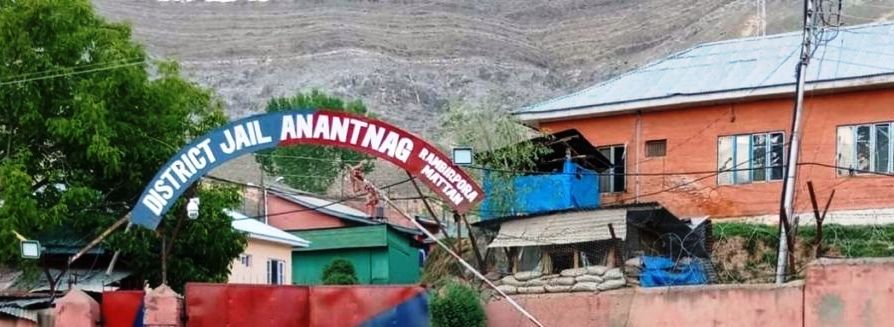The contagion managed entry into one of the many over-crowded jails in Kashmir pushing the families into a new crisis reports Khalid Bashir Gura

Cleric Mushtaq A Veeri, one of the many prisoners who tested positive for Covid-19 in District Jail Anantnag.
The spike in Coronavirus cases in Kashmir has found its way to the most protected places – the jails. Though the people in jails are completely insulated and isolated from the rest of the society, the contagion has found its way in.
In the district jail Anantnag at least 86 inmates have tested positive for the virus over the past two weeks. This includes the prominent religious cleric and vice-president Jamiat-I-Ahle Hadees, Mushtaq Ahmad Bhat Veeri, who was arrested and booked under the notorious Jammu and Kashmir Public Safety Act (PSA) last year, in wake of abrogation of Article 370. This has caused panic among the families of the inmates.
Mohammad Rafiq Ganai, 54, General Secretary of Jammu Kashmir Muslim League, too has tested positive. He was arrested on June 15, 2019, and detained under the Unlawful Activities (Prevention) Act. According to Ganai’s wife, she came to know about her husband’s disease through a newspaper.
“I hopelessly tried to approach relevant higher authorities but to no avail. Officially, no one is telling us anything, which in turn makes me more anxious about him. He is already suffering from multiple ailments like diabetes, hypertension which make him more susceptible to the virus,” said Uzma Rafiq, Ganai’s wife. “I appeal to authorities to give him and other inmates all the necessary medical care.”
Ganai is a father of two kids: a daughter studying in Class 12 and a son in Class 9. “Both the kids are equally worried about the well-being of their father in jail and constantly enquire about his release,” said Uzma Rafiq.
Zahoor Ahmad Bhat, 50, was the first prisoner to test positive for the Covid-19. He had shown symptoms of fever and chills. Zahoor, a resident of Trehgam Kupwara and brother of JKLF founder Maqbool Bhat is detained under the PSA since 2018.
He was shifted to district hospital Anantnag, where he is being treated in an isolation ward.
Adil Ahmad, his nephew says, the family was intimated through a call from the jail. “The news has shattered the family. We are worried about his deteriorating health,” Ahmad said.
Though earlier they had visited the Anantnag hospital they were told he has been quarantined and we were denied the meeting. “He has been ill for more than a month and until it got worse no one paid attention. We are desperate to see and meet him but we are helpless,” Ahmad said.
Bhat is the father of three sons and a daughter, the eldest one studying in class 11. “All of them want to see their father and are running from pillar to post. Recently we met the Superintendent of Police who gave us some hope of meeting him. But upon reaching the hospital we were told he has been shifted to jail, and at jail, we were told he has been shifted to some other location,” said the nephew.
Bhat had earlier been shifted from a Rajasthan jail to sub-jail Kupwara in February and eventually moved to Anantnag jail in March and slapped with third PSA in a row.

A view of the District Jail Anantnag
Given the state of jails, the families whose of prisoners are apprehensive of their safety and well-being, seek their release on humanitarian and medical grounds. The access to justice remains a challenge for them in times of lockdown. Many do not have the financial means to physically reach courtrooms or hire lawyers and the lockdown has only further worsened the situation.
Families allege that even though they have challenged the detentions, the ‘new normalcy’ in the courtrooms is making chasing the cases difficulty. There have not been many huge reliefs barring adjournments, they insist.
Recently taking into consideration the difficulties faced in conducting online hearings due to curbs on high-speed internet in the Union Territory, a division bench of the Jammu and Kashmir High Court, comprising Chief Justice Gita Mittal and Justice Sanjay Dhar, directed the UT Home Secretary Shaleen Kabra to appear before it through video conferencing to apprise it about the impact of the restrictions on e-connectivity of courts.
“Access to justice is a fundamental right and cannot be impeded”, the bench observed. “It has to be ensured to every citizen and courts are required to remain accessible.”
One of the Covid-19 detainees is a 22-year-old youth, from Srinagar. According to his ageing father, they are helpless and nothing is working for them. “The process is punishment,” said Mohammad Ashraf, the disillusioned and shattered father of the detainee. “We are suffering silently.”
The 22-year-old was arrested and slapped with PSA in 2018.
“The next hearing of his case is on August 4, but we are afraid it might be delayed further,” said the father. August 5 is the first anniversary of the event that has led to most of the arrests last year,
Lately, courts in Kashmir have resorted to online hearings but the access to justice for many families remains a challenge. “We went to civil court for medical bail but no one is allowed inside. It is only after that we went to Deputy Commissioner who told us to go to Superintendent of Police who in turn told us to inform the home secretary who will communicate to the nearby police station. But so far there is no reply,” said the friend of a detainee. “There was a hearing in lockdown but we could not go. We get hearing after three months and in a year only four hearings are conducted. Each hearing brings hope with it but it gets deferred on one pretext or another. ”
Since the imposition of Covid-19 lockdown, the families have not been able to meet the incarcerated. “About 44 of the detainees were cramped in a single cell on the day he tested positive.”
The cramped jails across UT worry families. They say it inevitably makes the elderly prisoners and people with co-morbidities susceptible to infection.
The congested jail with a capacity of just 60 inmates as per the website of Jammu and Kashmir Prisons Department has over 200 persons lodged in it. Against a lodgement capacity of 2830 inmates, the department is accommodating more than 3600 inmates in its jails according to the website. Eighty-eight per cent of them are under-trials, seven per cent are booked under PSA, and only five per cent are convicts.
In-charge Superintendent, Anantnag Jail, Sheroz Ahmad, confirmed the detection of 86 positive cases out of 250 samples. “The virus it seems came through doctors. A few weeks ago, a medical camp was organized in jail for diabetic patients. It was only after that one of the inmates developed symptoms,” said Sheroz. “Many inmates have been shifted to temporary quarantine jail at South Campus. Especially the people with symptoms and the asymptomatic have been isolated in jail cells. Almost 50 inmates are at the South Campus of Kashmir University who will be shifted back once the results come negative”.
Acknowledging that the jails are overcrowded, the SP said: “the jails that can accommodate 50 are cramped with 150.”
Despite overcrowding, however, the authorities are ensuring the isolation, physical distance and shifting of patients to outside jails and all necessary precautions including medical care to detainees.
“There is no permission and access for families to meet the inmates especially since March lockdown,” he said.
The jail authorities had taken 192 samples after the first case was detected. Later, they decided to test all the inmates as well as the staff in the jail. “Besides 86 inmates, a contractor, a labourer, and a jail employee have also tested positive,” added one of the higher officials.
DIG Prisons Mohammad Sultan Lone said one of the reasons for detection of the virus in jails is that the ration supplier to jails is also positive. He added that the general protocol is to not allow anyone meeting the positive patients, especially at a hospital.
“Being in prison means curtailment of liberty but criminal jurisprudence allows prisoners various rights,” advocate Shefan Jahan Gazi said. “We have prisoners Act section 7, 24, 37 which ensures that prisoners be provided medical care and assistance. Section 7 says prisoners have a right to safe shelter and safe custody and even that excess prisoners can’t be kept in the same jail. Further, under the prison manual, the visitors cannot be denied access to inmates”.
The families are hoping against hope for a glimpse of their loved ones as they have been deprived of the in-person meet since the pandemic broke out. Meanwhile, Tej Ram Katoch, Superintendent of the Central Jail Srinagar said his jail is free of virus and no case has been detected so far.
The post Jail Outbreak appeared first on Kashmir Life.
from Kashmir Life https://ift.tt/2DnhjIz
via IFTTThttps://kashmirlife.net
No comments:
Post a Comment